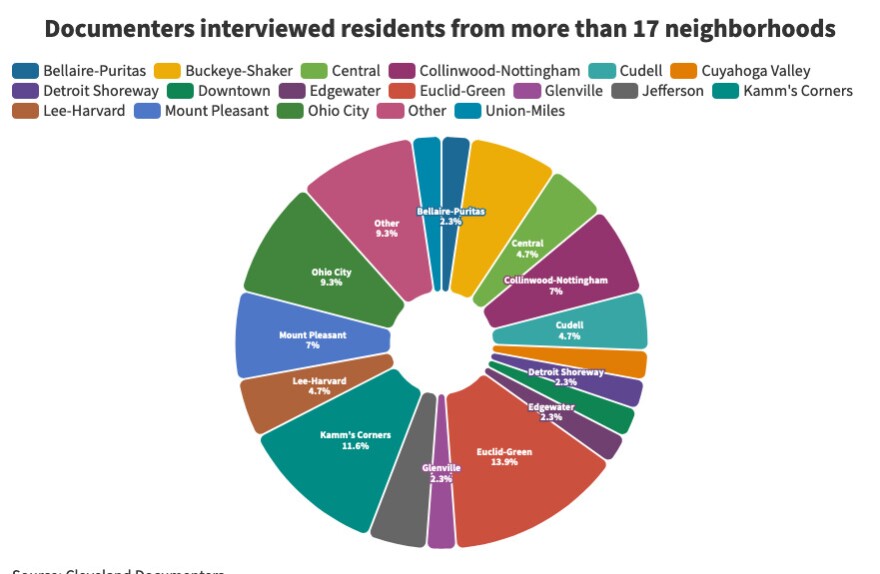By
Mount Pleasant resident Alan Bedingfield understands why fears exist about the new vaccines. But he’s also a “science buff,” and his sister works in cancer research, so he leaned on her expertise and his own personal research before deciding the vaccine was worth the risks.
The wider availability of coronavirus vaccines in recent weeks has many Clevelanders weighing whether to get the shots, which can protect against severe illness, hospitalization and death from COVID-19.
Cleveland Documenters interviewed more than 40 friends, family members, neighbors and residents from across the city over the past several weeks to understand their views, which in some cases were still evolving.
What they learned offers a unique window into what influences this important decision for Clevelanders.
“I understand that some may worry since the vaccine was created so quickly, and we don’t know the side effects,” Bedingfield, 57, told Documenter Candice Wilder.
And while long-term vaccine side effects are unknown, the same is true for those who get the virus and could experience long-term harm to their health.
“Overall, it can save your life in the now,” he said.

Clevelanders varied in how they researched their vaccine options. Residents who told Documenters that they got information from their doctors, health centers, or government sites such as the n – also called the CDC – were more likely to be vaccinated or to have a plan to sign up when they were eligible. None of the residents who took vaccines said they regretted their decision.
Amanda Light, 26, told Documenter Chau Tang that she would get the vaccine when it is available for her. She said she trusts, director of the National Institute of Allergy and Infectious Diseases. Light, who lives downtown, doesn’t think the vaccines were rushed. “They’ve been researching viruses like this before coronavirus happened,” she said. “These types of strains happen organically and that’s why we were able to develop a vaccine so quickly.”
Joseph Patrick Meissner was one of the Cleveland residents who said he turned to doctors and medical professionals for trusted advice on the vaccine. He also studied up on the public health responses to past crises such as the Spanish flu pandemic of 1918, the spread of smallpox and the Black Death, also known as the Bubonic Plague.
The 78-year-old Cudell resident used to rely more on television but now sees it more as a “giant propaganda machine.”
Meissner had a positive experience getting his vaccines at the recreation center in his neighborhood, through an initiative with the city’s Department of Aging.
“I think most people have become a little more positive in the last several weeks … They see the example of others getting it,” he told Cleveland Documenter Rosie Palfy.

Sean Corrigan said the vaccine is a “weight off his shoulders” because he is immunocompromised and has a higher risk of dying from the virus. The 54-year-old, who lives in the Euclid-Green neighborhood, said his friends are divided on the issue.
“My left-leaning friends are jumping at the chance to get vaccinated, and my right-leaning friends believe that they will be implanted with a government surveillance microchip,” he told Documenter Tina Scott.
Denajua Denujea got her vaccination in March. The 63-year-old Edgewater resident told Documenter Angie Pohlman that she wanted to see more discussion about the vaccine and pregnancy, though.
Denujea’s mother was given the medication thalidomide to treat morning sickness in the 1960s. Her little brother died when he was 2 because of the exposure, she said.
Often pregnant women are pushed into doing things that have not been tested enough, she said. And it makes her nervous.
“The virus is developing, and the fetus is developing,” she said. “We don’t have answers around this.”

The Rev. Dr. Leah Lewis told Documenter Kathryn Johnson that historical issues can play into vaccine distrust in the Black community but “this is not that.” “I don’t really get caught up in a lot of destructive rhetoric, that’s just not my bailiwick, can’t help people with that. I know that my friends, those in my social circle are very vigilant against COVID-19 and are very interested in getting the vaccine so they can get back to normal or our new normal, whatever that may be.”
Rhonda Wilson, 61, got her vaccine at East Technical High School because she works at a learning pod at the Fatima Family Center.
What’s on Wilson’s mind, though, are folks who don’t believe in vaccines or the virus. “What will that mean for the rest of us who care about living and not being super spreaders?” she asked Documenter Sheila Ferguson.
Wilson said it also needs to be clear to people that they don’t have to have health insurance to get a vaccination. “That could be holding people back from getting vaccinated,” she said.
Voices on the Vaccine is a collaboration between and , a network of residents trained and paid to document local government meetings.
-
Quite a few residents who were interviewed jumped at the chance to take the vaccine, though some still worried about barriers that could be keeping fellow residents from having the same opportunity.
-
In Cuyahoga County, as of April 16, more than 490,000 people had at least one dose of coronavirus vaccine. Black and Latino residents were about half as likely to have gotten a dose as white residents.




